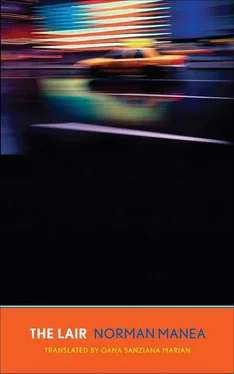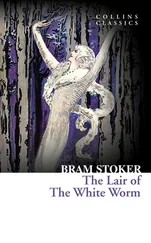Past, present, future, time at one with itself, was that the horizon? Mild waters, moments aging, rot and dejection. The water grows slowly, quietly, comfortingly, over the sleeping passenger. The conductor taps him gingerly on the shoulder. The train is stopped in the station.
He quickly gathers his bag, his jacket. He descends; he’s on the platform; look at him, poor lost sucker, in the station, gazing at the wide and quiet river in front of him.
Oof, he’s arrived! The empty platform, the mountains in the distance, the river only a stone’s throw away. A clear, cold afternoon. The beginning of the world. He doesn’t yet have a clue how close the end is. The end of his world.
The chronometer swallows the seconds of the armistice.
Peter appeared suddenly, as though in a dream, or in a nightmare.
“Peter. Ga  par. Mynheer. Mynheer Peter Ga
par. Mynheer. Mynheer Peter Ga  par here.”
par here.”
A voice from the void. Professor Gora was no longer sure where he was. He took note of the walls lined with books and remained silent. He was in no mood to answer; it was an aggressive surprise.
Peter! Was it Mynheer Pieter Peeperkorn, the popular protagonist from the great novel he’d read decades ago, once the novel of his world? Or Peter Ga  par, dubbed Mynheer, from the socialist literary cafe in the Balkans?
par, dubbed Mynheer, from the socialist literary cafe in the Balkans?
Nothing was certain, except for the bookshelves, those in front of him and the ones in his mind.
Young Ga  par’s only publication from the years of “legalized bliss,” as he used to call his former utopia, was titled Mynheer. The story behind the nickname was thin and bizarre; chance had conspired with the library.
par’s only publication from the years of “legalized bliss,” as he used to call his former utopia, was titled Mynheer. The story behind the nickname was thin and bizarre; chance had conspired with the library.
How had Peter Ga  par found the phone number of Professor Augustin Gora, who had vanished into the great United States of America?
par found the phone number of Professor Augustin Gora, who had vanished into the great United States of America?
“Where are you? Have you also made it to the other world?”
The ghost confirmed that, yes, he’d come some time ago, as a doctorate fellow at New York University.
“A doctorate? In architecture? Weren’t you …?”
“No, I wasn’t an architect. Just a technician-architect. A junior in college when they arrested my father again; they expelled me. Three years of architecture were equivalent to a midrange school.”
“There’s such a thing as a doctorate here … ”
“In art, Professor. History of art. Even in our tranquil Homeland, there were night classes. Art history classes. You couldn’t have known this.”
“No.”
Not true, but he wasn’t in the mood for a long conversation.
Ga  par explained that he had no intention of becoming an expert in German abstract expressionism, as his scholarship promised. He simply wanted to remain in the New World.
par explained that he had no intention of becoming an expert in German abstract expressionism, as his scholarship promised. He simply wanted to remain in the New World.
Right now, when hope was being reborn in Eastern Europe? He wasn’t a young man anymore; nor had he come for the future of his nonexistent children. And so, then? Was he alone? No, Lu had come with him. She’d finished university with an English degree, as Professor Gora knew all too well. English would dull her in this land, where she’d moored, or run aground. Yes, she had initiated Peter in the New World’s native language, with underwhelming results; he couldn’t decipher the station names as they were announced in the subway. For the time being, he had no work permit.
Laconic answers to Professor Gora’s spare and weary questions.
“I’d had enough, that’s all. I’m not the adventurous type, and I’m not interested in tourism. But I’d never left my country even once. Not once! Forty years of legalized bliss, in the same place! But now I’ve left! For good, as you say here. I have an absolute, urgent need for irresponsibility. At least now, before the funeral processions. Ir-re-spon-si-bil-i-ty.”
He accentuated this word, heavily, twice, as if he were talking to an idiot, or simply to himself. Ir-re-spon-si-bil-i-ty.
He was speaking of an end, not a beginning, about getting out of a situation, not of entering another. About a departure, not an arrival.
“You’re right. I’m not staking my claim to a new place; I’m freeing myself of the old one. The same hide-and-seek game with death, somewhere new, outside of the old cage. For the time being, I need a job. A salary. It would be both dishonest and wearisome to keep up the charade of the scholarship. Lu’s a babysitter now. She’s always liked the children she never had.”
So, the adventurer had, in fact, come for the adventure … Gloomily, Professor Gora smiled, measuring with his eyes the shelves full of adventure.
“You’ve come for adventure.”
“I didn’t say adventure. Ir-re-spon-si-bil-i-ty.”
Peter Ga  par made sure to specify that Professor Gora wasn’t to send him money. He just wanted advice from time to time, or, at least, to be able to talk to someone familiar, that was all.
par made sure to specify that Professor Gora wasn’t to send him money. He just wanted advice from time to time, or, at least, to be able to talk to someone familiar, that was all.
Familiar? Yes, they’d gotten to know each other when Gora was Ludmila’s husband.
“We’ll be in touch,” and that was all that the newcomer wanted to say.
Some time had elapsed since that nebulous conversation with Peter. Or had it been nebulous only in Gora’s mind? Peter maintained that though he’d arrived in America resolved not to look for Gora, he’d changed his mind without knowing why. Time passed between his arrival and this decision, and some more time passed after this first conversation, as well. Peter disappeared but continued to haunt Gora. The professor asked himself how he should define reality. He closed and reopened his eyes, looked at the bookshelves, the large and lustrous desk, the computer, the pair of red gloves on the edge of the table, the telephone, the big, open folder spilling a pile of blank pages.
Peter Ga  par evoked memories about which he was no longer — and didn’t want to be — sure. He had increasingly more faith in books than in memories he didn’t want anything to do with. He believed in what survived in writing. The mind and soul of the interlocutor. The interlocutor that he was now belonged to the past.
par evoked memories about which he was no longer — and didn’t want to be — sure. He had increasingly more faith in books than in memories he didn’t want anything to do with. He believed in what survived in writing. The mind and soul of the interlocutor. The interlocutor that he was now belonged to the past.
A stranger among strangers, one may still reencounter friends from a previous life. In books! The books from his previous life were waiting for him. Hopeful comrades, they welcomed him in other languages. Loyal conversationalists, ready to restore his familiar habits, to humanize his wandering.
He wasn’t at all in the mood for Peter Ga  par. Pieter Peeperkorn, yes. He was happy to encounter Mynheer Peeperkorn again, and immediately following the telephone conversation, he reread those three chapters about the Dutchman in the massive novel of the 1920s.
par. Pieter Peeperkorn, yes. He was happy to encounter Mynheer Peeperkorn again, and immediately following the telephone conversation, he reread those three chapters about the Dutchman in the massive novel of the 1920s.
In the sanatorium of The Magic Mountain, Hans Castorp is waiting wistfully for Clavdia Chauchat. The woman of his dreams appears on the arm of a fabulous companion. Tall and rosy brow, dense lines. Long, thin, white hair, thin goatee. Large mouth and nose, mangled lips. Wide, spotted hands, long, sharp nails. With his stature and accent, the Dutchman dominated the society of the sanatorium. Jerky, elliptical, incoherent discourse.
That set-ties it. And you must keep in mind and never — not for a moment — lose sight of the fact that — but enough on that topic … So then, Emchen my child, listen well: a little bread, my dear.
Читать дальше

 par. Mynheer. Mynheer Peter Ga
par. Mynheer. Mynheer Peter Ga 










